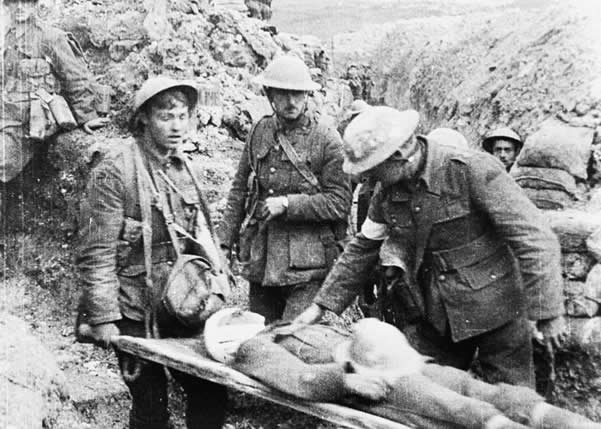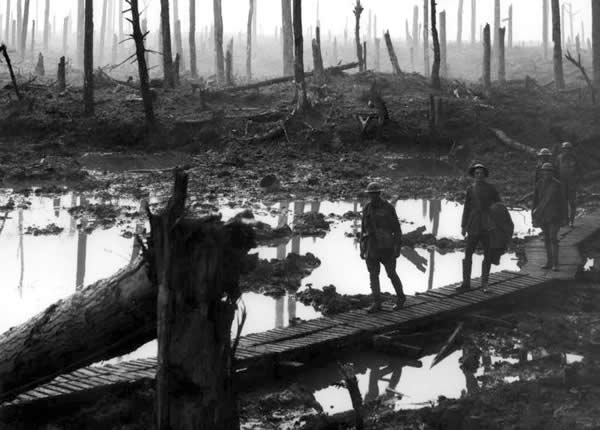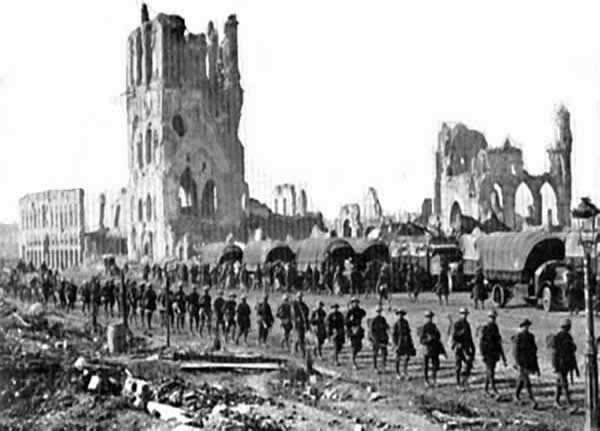2 men from Lemsford Died at sea - They were Fred Bunnidgeand Thomas Cole
German battleship "Pommern" - sunk at Jutland The greatest naval battle of the First World War. Jutland had all the ingredients to be a great British naval victory, but in the event the result was much less clear-cut.
The recently appointed commander of the German High Seas Fleet, Reinhard Scheer, had returned to the policy of making sorties against the British coast, confident that his codes were secure, and thus that the main British battle fleet, at Scapa Flow in the north of Scotland could not intervene. However, the British could read German coded messages, and were aware of Scheer's plan.
At the end of May, Scheer sortied with the entire High Seas Fleet, expected that the only serious threat he would meet was Admiral Beatty's battle cruiser squadron based on the Forth. Unfortunately for his plan, the Royal Navy knew he was coming, and the Grand Fleet sailed only minutes after the High Seas Fleet.
Both fleets sailed in a similar formation, with a scouting squadron of battle cruisers sailing ahead of the main battle fleets. The battle falls into five main phases. The first came when Admiral Beatty, commanding the British battle cruisers encountered their weaker German equivalent under Admiral Hipper, (31 May) and chased them south towards the main German fleet.
The second phase saw Beatty flee north, pursued by the German Dreadnoughts. So far, both sides thought the battle was going to plan, although a design flaw led to the destruction of two British battle cruisers. Now, in the third phase the Germans got a nasty surprise. Thinking themselves involved in a chase that would end with the destruction of the British battle cruisers, they found themselves under bombardment from Jellicoe's battle fleet, which they had thought to be too far north to intervene.
The heavy British guns quickly forced Scheer to order a retreat, but then Scheer made what could have turned into a grievous error, turning back, possibly hoping to pass behind Jellicoe, and escape into the Baltic.
However, Jellicoe had slowed down, and the German fleet found themselves crossing in front of the British fleet, and in ten minutes of gunfire suffered 27 heavy hits while only inflicted two. Once again, Scheer ordered a retreat.
Admiral Reinhard von ScheerFinally, in the last phase of the battle, in a night of intense fighting, the retreat of the German battleships was covered by their lighter ships, while Jellicoe lost time after turning to avoid a potential torpedo attack.
The Germans lost one battle cruiser, one pre-Dreadnought, four light cruisers and five destroyers, while the British lost three battle cruisers, four armoured cruisers, and eight destroyers. However, many of the surviving German heavy ships had suffered serious damage, and one result of the battle was to increase the British dominance in heavy ships.
Jutland was the last, and largest, of the great battleship battles. Neither submarines or aircraft played any part in the battle, despite the plans of both sides. Never again did battle fleets meet again in such numbers. While the Royal Navy suffered more loses, the battle effectively ended any threat from the High Seas Fleet, which now knew it could not contest control of the North Sea with the Royal Navy.
The great fleet which Kaiser Wilhelm II had been obsessed with, and which had done so much to sour relations between Britain and Germany had proved to be a blunted weapon. Despite that, the battle disappointed in Britain, where news of a new Trafalgar had been expected, and the hard fought draw at Jutland was not appreciated until much later, while the Kaiser claimed a German victory.
Source firstworldwar.comCommonwealth War Graves
Lest We Forget
From 1914 to1918 97 men and one woman went to War - 20 men never came home. Read the life history of each man and learn where they died
Those Who Gave Their LivesLemsford local History Group WW1 Records
Memories & Letters
Memories from the people of Lemsford Parish – letters from the Front and home and much, much more
Local Parish Magazine
From the Bishop's Hatfield Parish Magazine 1914 to 1918, Church- Social - War Records
Servicemen of Lemsford
War records from 98 men who went to war. We show their memories images and why we should never forget them.
5 Facts the Great War
Battles of WW1

Battle of the Somme
1 July - 13 November 1916The British suffered around 420,000 casualties, the French 195,000 and the Germans around 650,000. Only in the sense of relieving the French at Verdun can the British have claimed any measure of success.

Battle of Passchendaele
31 July - 6 November 1917Passchendaele village lay barely five miles beyond the starting point of his offensive. Having prophesied a decisive success, it had taken over three months, 325,000 Allied and 260,000 German casualties

The First Battle of Ypres, 1914
October 19 to November 22, 1914First Battle of Ypres saw the BEF sustain 7,960 killed, 29,562 wounded, and 17,873 missing, while the French incurred between 50,000 and 85,000 casualties of all types. To the north, the Belgians took 21,562 casualties
